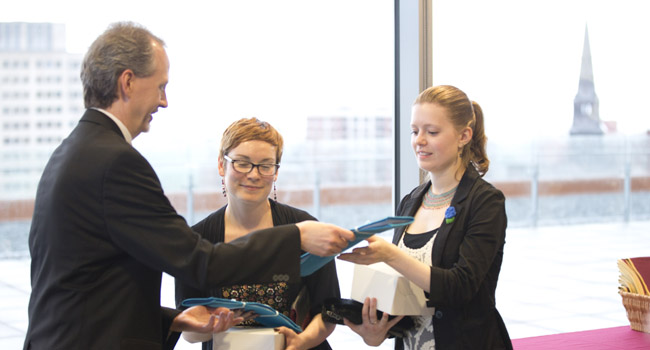Program teaches students about themselves

By Karl Hele
First Peoples Studies programs offer students from both Indigenous and settler communities an opportunity to learn about themselves, while engaging with alternative perspectives, histories, and worldviews.
On June 9, 2014 two of my students – Thea Cammie (Newfoundland Mi’kmaq) and Emma Kreuger (non-Inuit resident of Nunavut) – became the first to graduate with a BA major in First Peoples Studies from Concordia University. Three days later, alongside all of Concordia’s Aboriginal graduates, Emma’s and Thea’s achievements were honoured with sweetgrass baskets and Eagle feathers.
For Thea, that ceremony “will continue to hold more significance to me than the convocation itself.”
It was a great personal pleasure for me, as director of the newly-inaugurated program, to congratulate and honour the graduates. Various speakers talked about education’s promise while noting that it was equally important that graduates offer something of themselves to their communities.
With their degrees in hand both Thea and Emma plan to return to their communities to share the knowledge they gained while continuing to learn. Their dedication speaks well of these students. Emma refused to graduate without completing the major, thereby delaying her degree by one year. Thea immediately declared First Peoples Studies as a major the moment Concordia’s administration opened the program for registration. Both students worked hard to ensure their degree completion, along with university faculty and administrators.
During the convocation, well-known Quebec media commentator Chantel Hebert received an honourary doctorate, and her keynote speech addressed the need for all graduates to go forth and become engaged in Canada. Despite her rhetorical slippage in claiming that Canada did not have a lengthy history like Europe, Hebert’s call for the graduating class to engage with each other and politicians would contribute to the need for reconciliation between First Peoples and Canadians.
Concordia’s inaugural graduation speaks to the goals and principles of First Peoples Studies: respect, honour, learning, sharing, and growing as we learn about each other and ourselves along a lifelong path laid out by the Medicine Wheel. For me, seeing an Indigenous and non-Indigenous person as the first graduates symbolizes why these programs were created and need to exist.
Thea and Emma demonstrate the need and objectives of First Peoples-centred learning in a non-Indigenous educational institution. By promoting positive learning environments that prioritize First Peoples knowledge and methods, while using western academic tools, both Indigenous and settler students can succeed.
In a letter of thanks, Thea touched on this learning objective in her hope to have professors with “passion and dedication to learning and the sharing of knowledge as well as challenging their students to always think deeper, use critical thinking, and always be questioning.”
Above all, I’m hoping that graduates of First Peoples Studies programs across Canada will leave academic institutions with a better understanding of each other and the worlds around them.
Karl Hele, Garden River First Nation, is director of the First Peoples Studies program at Concordia University in Montreal.


